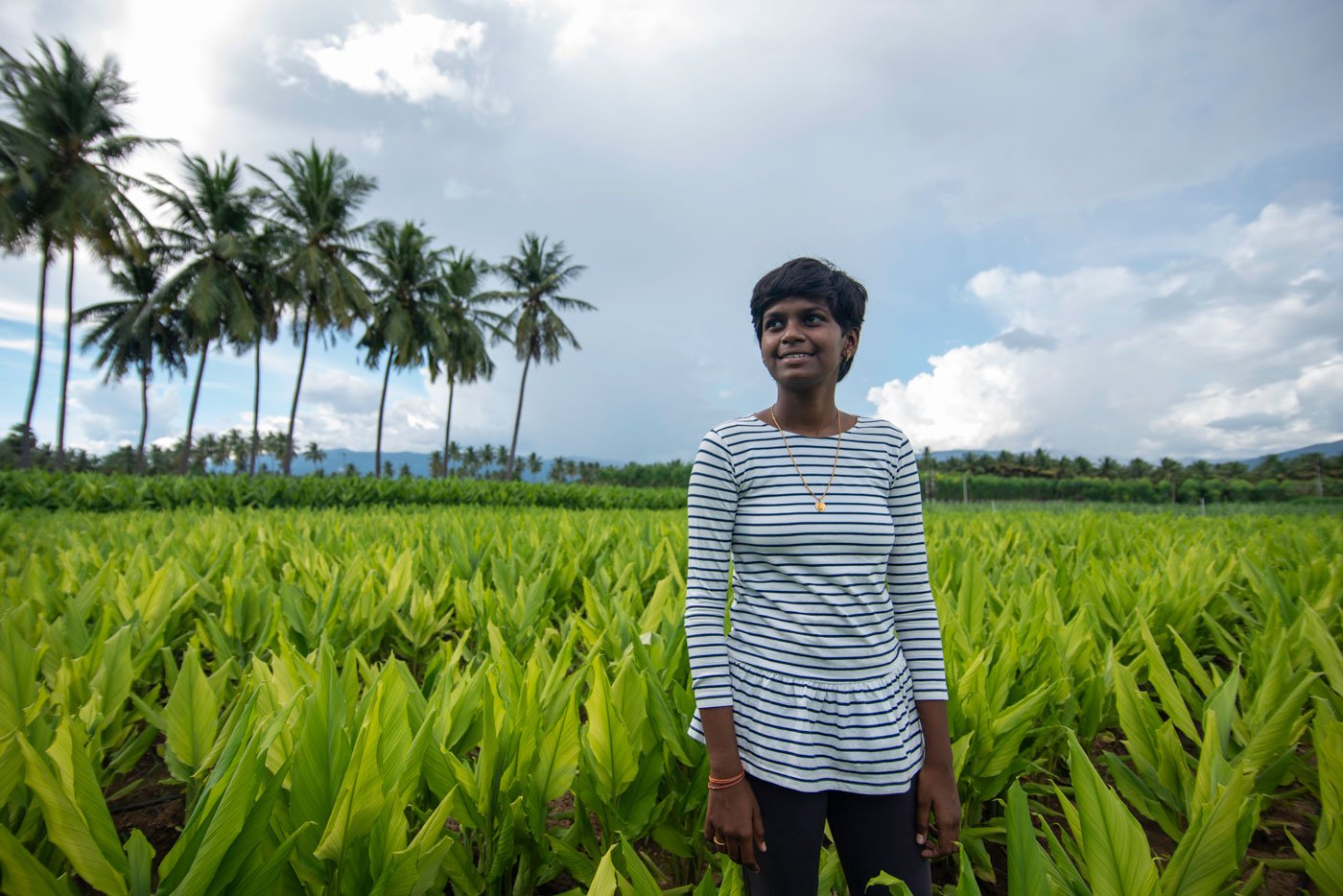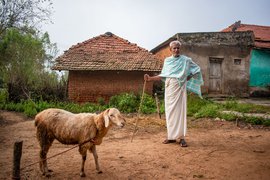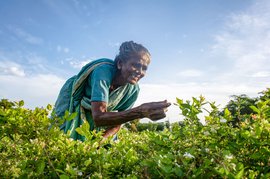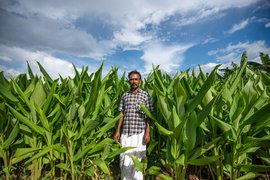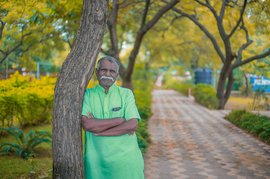A sword in her right hand, a horse’s reins in her left, the legendary Rani Velu Nachiyar was one of the most photographed – and spoken about – historical figures in Tamil Nadu’s Republic Day parade in Chennai. She figured in a tableau that included other Tamil greats like V.O. Chidambaram Pillai, Subramania Bharathi and the Maruthu brothers.
The same tableau, representing ‘Tamil Nadu in the Freedom Struggle,’ had been rejected for the R-Day parade in New Delhi by the union government’s ‘expert’ committee . Tamil Nadu Chief Minister M.K. Stalin’s plea to the prime minister to intervene was not heeded. Ultimately, it ran as a hugely popular float in the state’s own R-Day parade in Chennai.
The centre’s ‘expert’ committee had said, among other things, that some of the figures were “unknown to a national audience.” Akshaya Krishnamoorthi might hotly disagree. She believes she has a personal connect with one of them: Velu Nachiyar, who fought the British and ruled Sivagangai (now a district in Tamil Nadu) until her death in 1796.
“The turning point in my life was when I played the lead role of Velu Nachiyar in my school dance drama in Class 11,” she says.
“But it wasn’t just acting and dancing you know,” explains Akshaya. She felt the strength and courage of the ‘Veeramangai’ – as the queen is called – through the songs and lyrics. A trained classical dancer, Akshaya remembers she was unwell on the day of the inter-school competition and not sure if she would be able to perform. But she gave it her very best.
When she came down from the stage, she fainted. She was taken to hospital and given a saline drip. “I collected the prize – we came second – with an IV line in my hand.” That incident taught her to believe in her own potanpotential. She “became bolder,” learnt to drive a bike and a car.


Tamil Nadu's tableau for the Republic Day parade, with Rani Velu Nachiyar (left), among others. The queen is an inspiration for Akshaya Krishnamoorthi
Akshaya is the first graduate in her family. She is also an entrepreneur, innovator and motivational speaker.
And all of 21 years old.
Akshaya lives with her parents, younger brother, aunt, one dog and many birds (budgerigars or common parakeets) in her hometown Ariyappampalayam, near Sathyamangalam, in Tamil Nadu’s Erode district. It is a tiny dot in the state map. This Bachelor of Business Administration (BBA) graduate hopes to, someday, put it on the national one.
This entire belt of Tamil Nadu, including Coimbatore, Karur and Tiruppur, has an impressive history of entrepreneurship from below. So Akshaya – whose parents dropped out after Class 10, and own no land – is a young entrant to an old tradition.
“My age is my advantage and disadvantage,” Akshaya grinned, when PARI met her in October 2021. We were seated in turmeric farmer Thiru Murthy’s living room after a visit to his fields, sipping tea and eating bajji . The meeting was memorable. Akshaya is articulate, flicking her short hair away from her face, as she outlines her big, beautiful dreams.
Her favourite quote is also about it: “live your dream by doing it today.” She uses it in the motivational speeches she gives at various colleges. She uses it in life, in her business, while establishing her brand name ‘Surukupai Foods.’ Surukupai is Tamil for drawstring pouch – a phrase that captures nostalgia, thrift and sustainability, all at once.
Her zeal to do something on her own was not unexpected. “My friends and I started Uliyin Uruvam Trust – named after the sculptor’s chisel – when we were in college. It is a student-led organisation to help others like us from small towns get ahead in life. Our aim is to create 2,025 leaders by the year 2025.” Ambitious. But then, so is Akshaya.
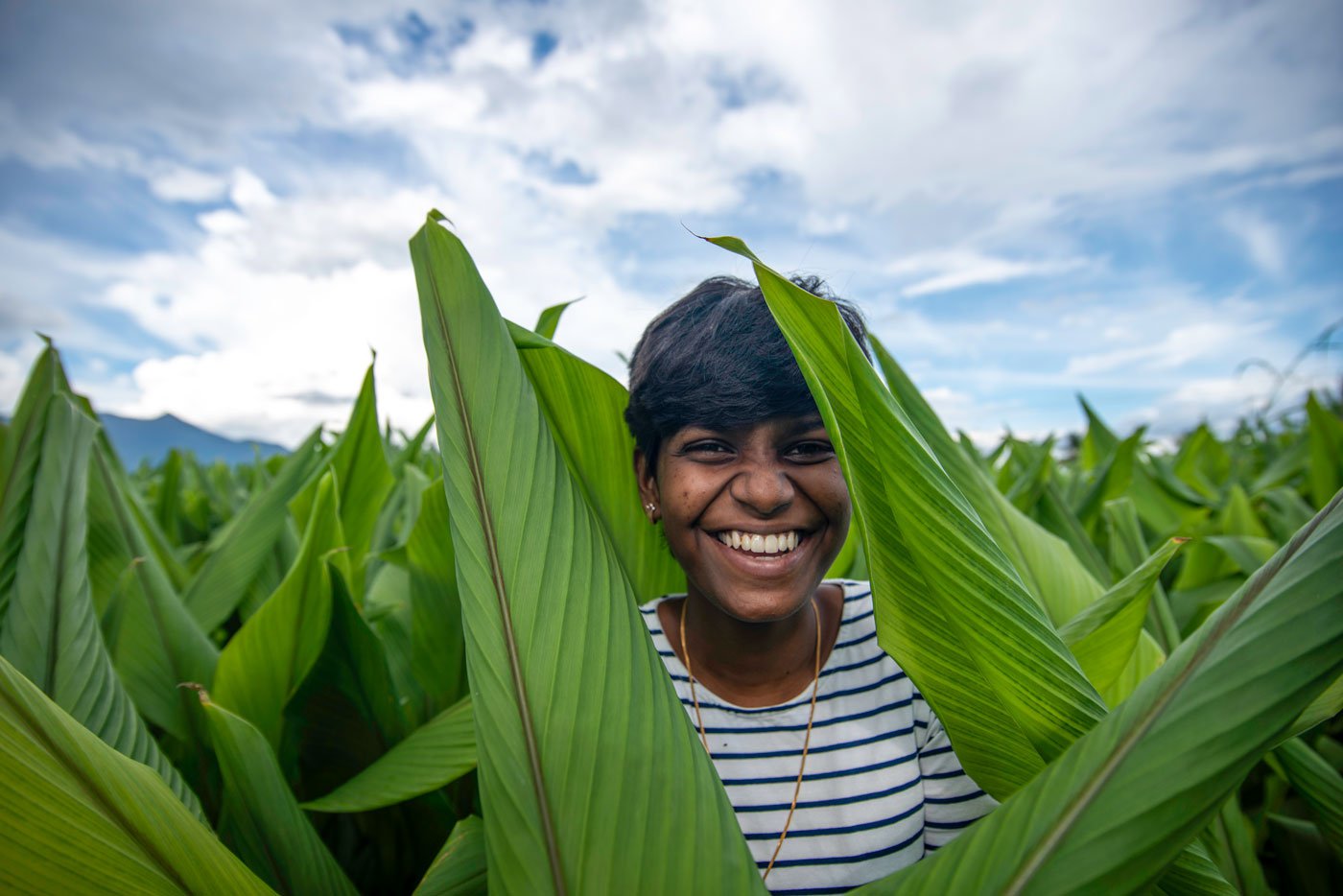
Akshaya in Thiru Murthy's farm in Sathyamangalam. She repackages and resells the turmeric he grows
While she knew she wanted to be an entrepreneur, the nationwide lockdown that began in March 2020 – just before she graduated – severely limited her options. That’s when she met Thiru Murthy, an organic farmer from Uppupallam hamlet near Sathyamangalam. He was an old friend and customer of her parents’ home appliances store. “They knew each other from the time Appa [father]
had a radio-cassette shop,” Akshaya recalls.
Thiru, whom she calls ‘uncle,’ runs a profitable turmeric business – adding value to his harvest, selling it directly to the customer. Akshaya thought she could repackage and resell his products. His response was encouraging: “ eduthu pannunga ” (take it and do it). “Uncle was so positive,” Akshaya smiles. And Surukupai Foods was born.
The first exhibition she went to with her new company was promising. Called Tan Food ’21 Expo, it was a grand event held in Madurai in February 2021. Over two thousand people visited her stall. She understood – from their feedback and later through market research – the importance of branding and packaging.
“Customers had a personal connect with our brand name,” says Akshaya, “plus it was innovative. Until then, turmeric was only sold in plastic packets. Nobody had seen it in paper sachets, in a drawstring pouch!” Neither FMCG majors nor boutique organic stores had thought of her simple idea. She had a winner. And she wanted more.
To grow her business, she sought the advice of many people and organisations. Among them, her mentors, Dr. M. Natchimuthu and Shanmuga Sundaram of Potan Super Foods. And the Madurai Agri Business Incubation Forum (MABIF) helped her get a trademark and FSSAI certification. And yes, Akshaya does read self-help books when she can. One of the last was titled: Attitude is Everything .
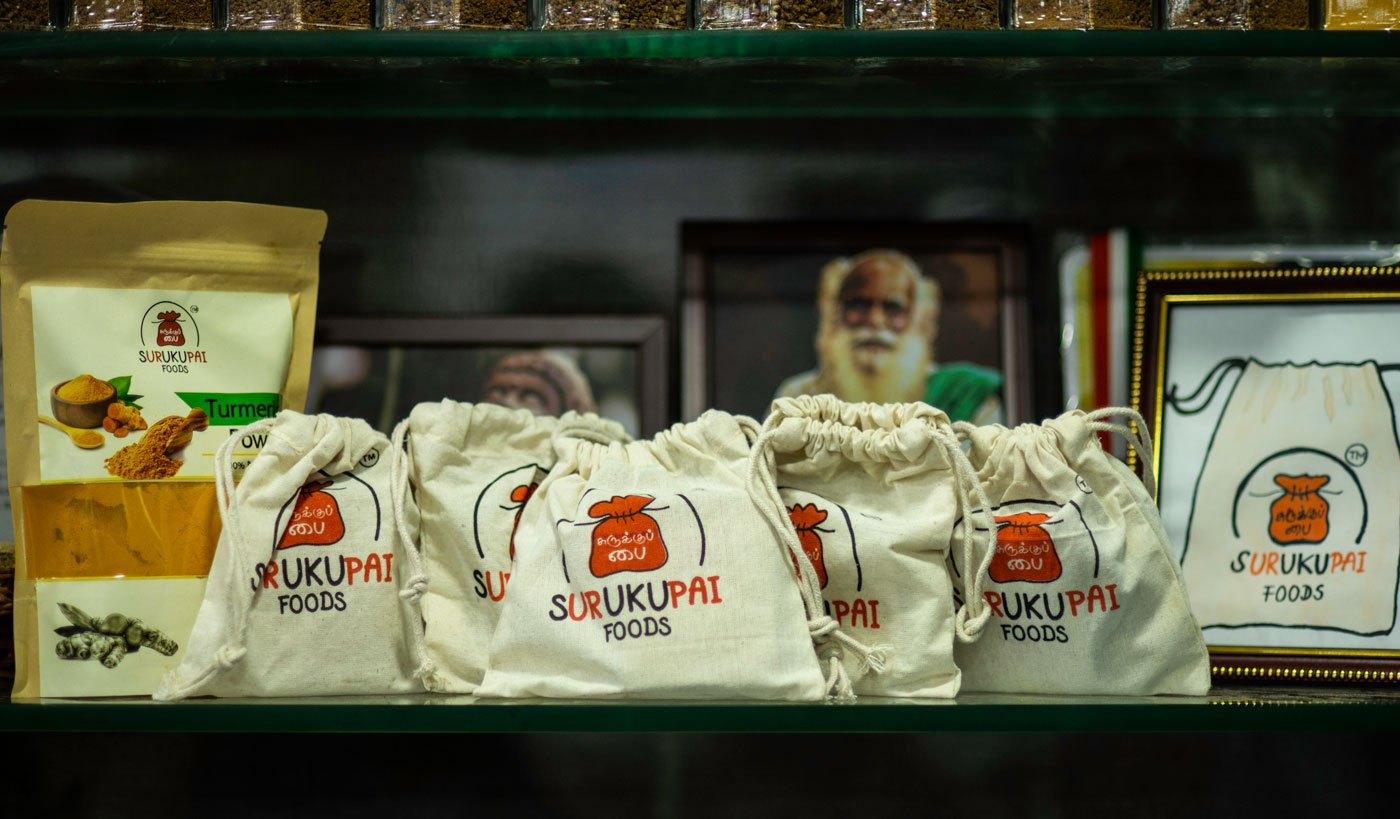
Akshaya's Surukupai Foods products on display in Akshaya Home Appliances, the store owned by her parents
“My BBA course didn’t give me the knowledge or exposure to start and run a business,” she says. She has a big grouse with the education system. “Why do they not teach people to do basic bank transactions in college? About applying for a bank loan in BBA? How come even the HoD and teachers have no real-world experience?”
She’s busy trying to fill those gaps herself. “I have so much to learn.”
To do that effectively, she writes a to-do list every day. And strikes out what she’s finished. “I note things down in a small diary. Any item I don’t ‘cut out’ by the end of the day, I mark it again for the next.” It leaves her with a “guilt feel,” and she tries harder.
Her efforts paid for three semesters of her post-graduation. And her choice of a course is interesting. “I’m doing my Master’s in Social Work through distance education. The fee for each semester is 10,000 rupees and the exam fee is another 5,000. Appa gave me 5,000 in the beginning. Rest is my own money,” she explains, her voice tinged with a quiet pride. The ‘rest’ came from the 40,000-rupee profit she turned from an investment of 10,000 in launching her business.
Her customers buy her products in ‘bulk’. And she customises options for them. Her fast-moving item now is a wedding invitation gift hamper full of organic turmeric products. She believes she’s possibly the first – and only one – to offer this. “I price them from 50 to 100 rupees. Each hamper contains a drawstring pouch, sachets of turmeric powder, 5-gram packets of seeds (native varieties of brinjal, tomato, okra, chilli and spinach) and a thank-you card.
“When people go to invite their relatives and friends for a wedding, they present this hamper along with the invitation. It’s auspicious, healthy and earth-friendly,” says Akshaya. When her clients want a fancy hamper, and they’re willing to pay, she packs larger quantities of turmeric powder in elegant glass bottles. She’s supplied this larger package for a few weddings, and through word-of-mouth publicity, she gets more orders. “The last one was for 200 hampers, at 400 rupees each.”
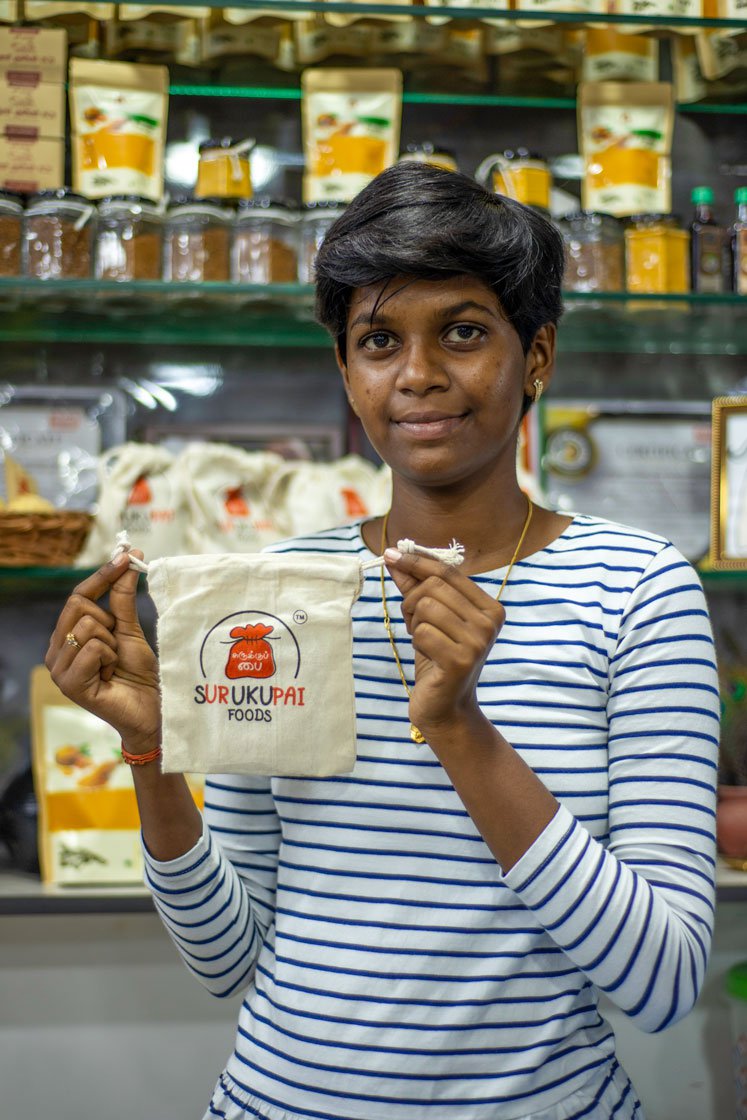
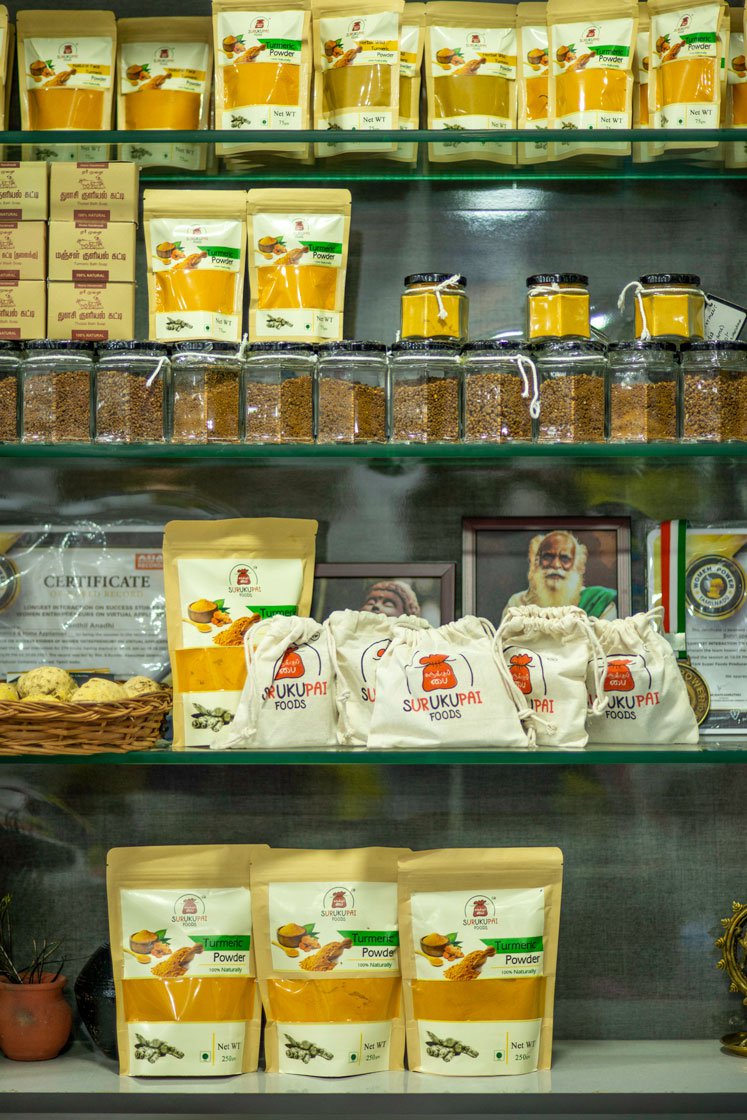
Left: Akshaya with a surukupai , or drawstring pouch, made of cotton cloth. Right: The Surukupai Foods product range
Months after my visit to Sathyamangalam, Akshaya and I chat on the phone. Halfway through our call, she drops off: “Bank manager is calling me.” An hour later, she explains it was an inspection visit. She’s been sanctioned a loan of Rs. 10 lakhs from a public sector bank. She applied for it herself, preparing all the documentation, and got it without collateral at nine per cent interest. She’s used the bank loan to set up a turmeric unit with a machine that will grind and pack the powder hygienically. She wants to grow big. Quickly.
“I have an order for one ton of turmeric powder. So I’ve bought commercial turmeric from traders,” she says. The machinery itself is tricky. “I learnt how to make advertisements in college. I don’t know anything about sensors in fully automatic machines and paper pulling and roll placing. If it is not done properly, the batch will go waste.”
She lists the many things that can go wrong, but believes it will be worth the risks. She believes that with the machine – to run which she hires two part-time helpers – she can, in the near future, reach a turnover of up to Rs. 2 lakhs a month. And so, much higher profits than those that saw her through her college degree.
Yet, what Akshaya is doing goes beyond personal gain. Her effort upends hierarchical structures in the agri-business chain – typically dominated by male-controlled businesses or corporates.
“That turmeric processing is happening at the hyperlocal level, right next to where the crop is being grown, is in itself great news,” says Usha Devi Venkatachalam, founder and CEO, Krishi Janani (a Kangayam-based social enterprise that works for profitable and regenerative agroecology). “Plus, there aren’t that many young women at the forefront of agri-processing companies. Women’s role, especially in post-harvest processing, has slowly been taken away in the name of mechanisation and centralisation.”
One of the problems with food supply chains, Usha continues, “is that they are so centralised and have made so many crazy processing decisions that apples grown in the US go to South Africa for polishing before heading to India for consumption. This is untenable in the post-pandemic world. And it is even more serious when you think about how much this transportation is contributing to the climate crisis.” For instance in consumption of power and fuels.
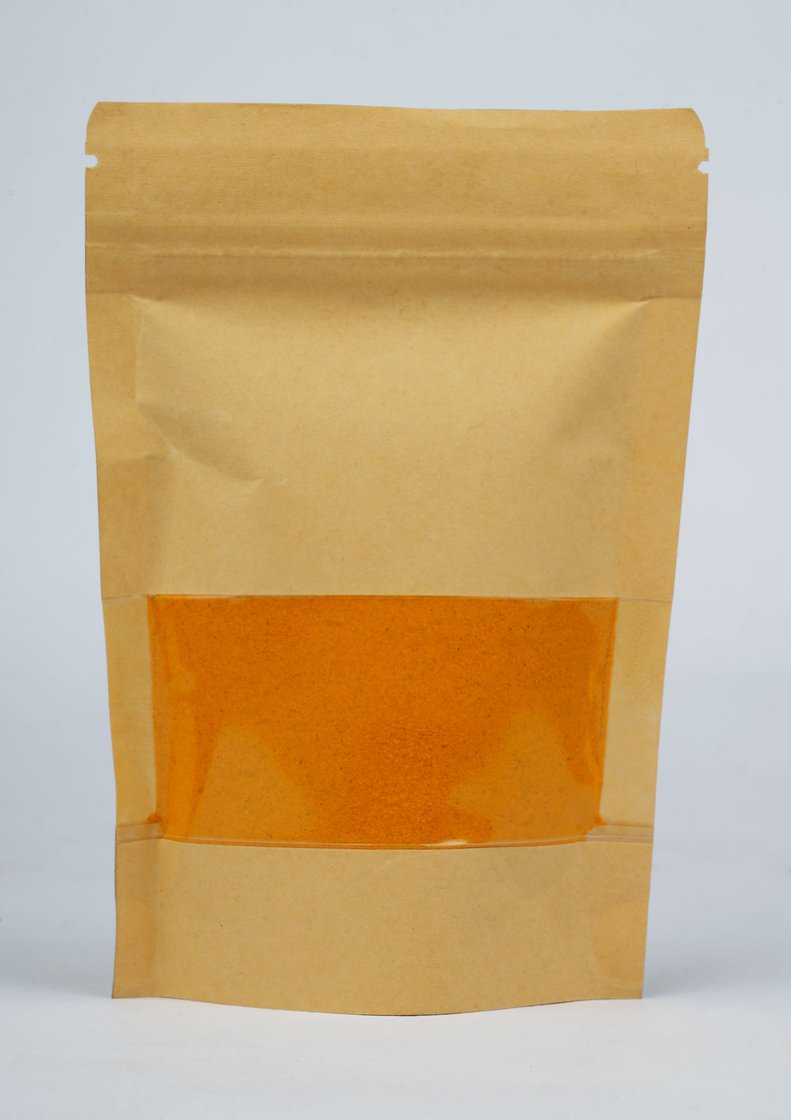
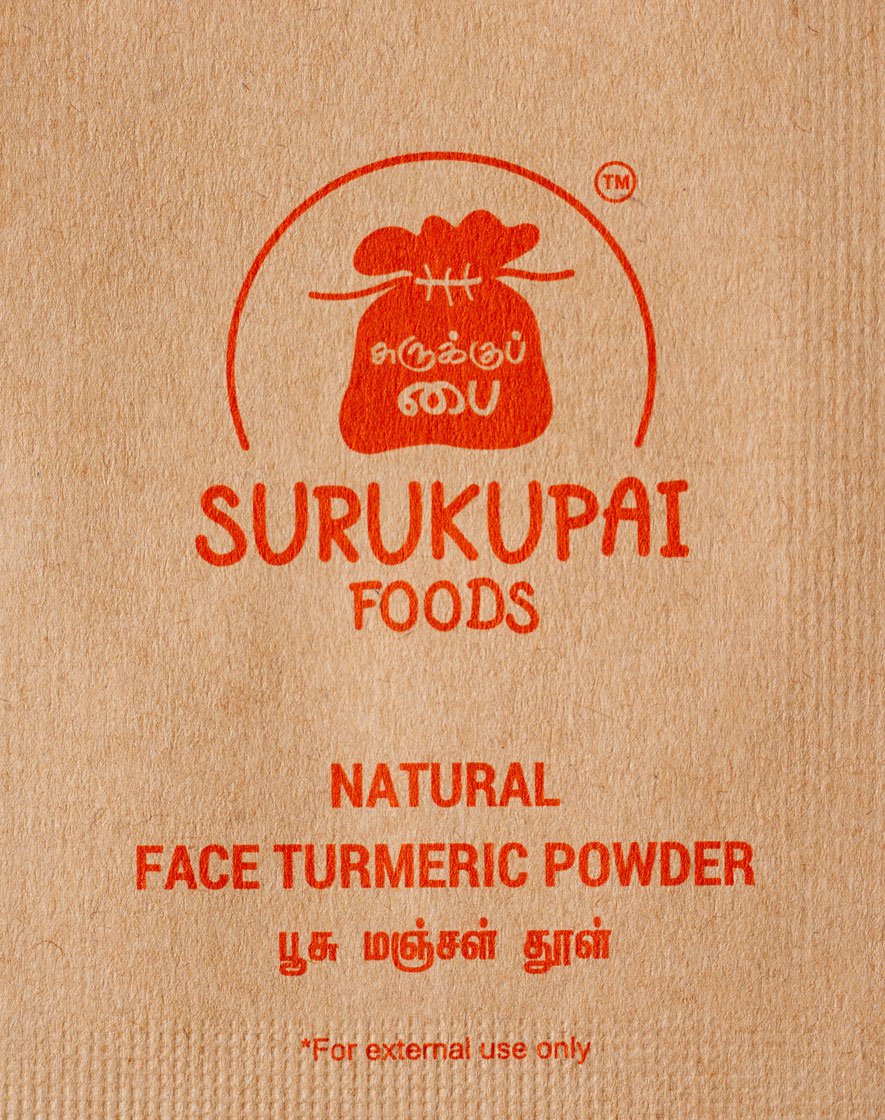
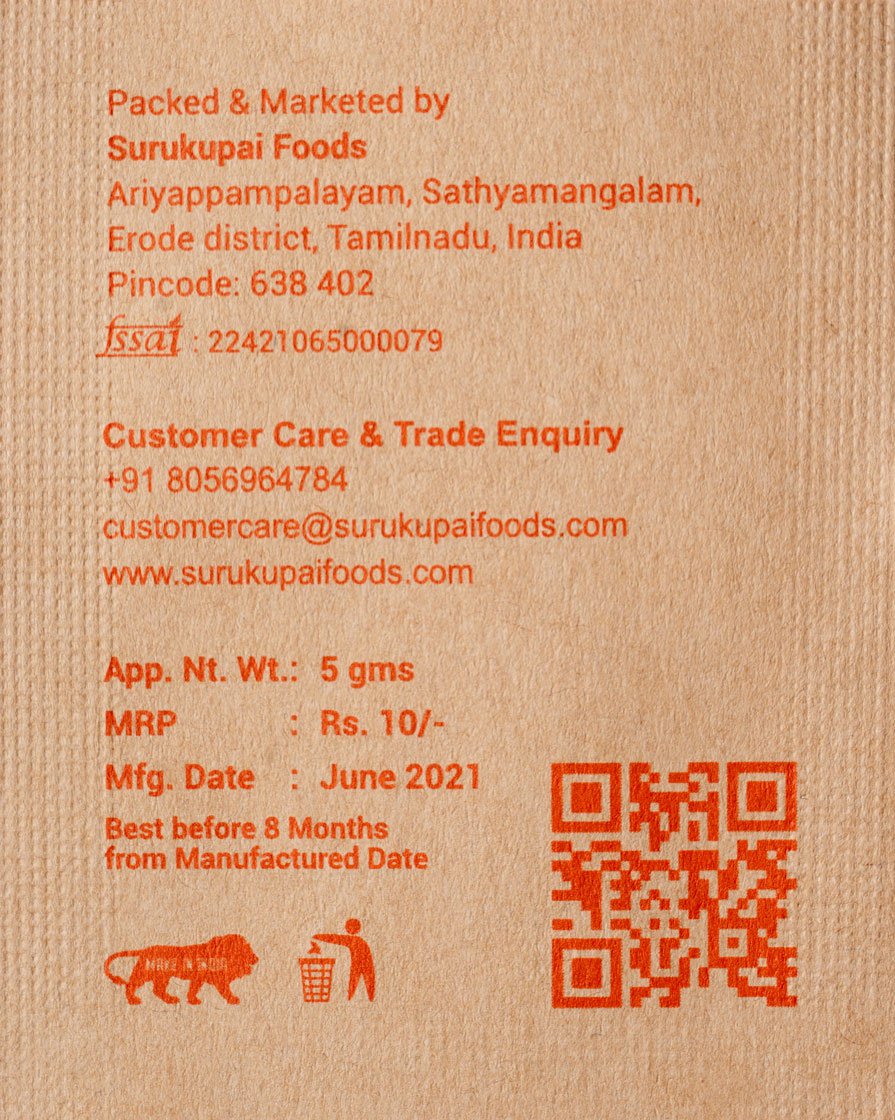
The biodegradable sachets
in which Akshaya sells turmeric under her Surukupai Foods brand. She says she learnt the importance of branding and packaging early in her entrepreneurial journey
Akshaya’s long-term plans may not address all of that. But her out-of-the-box idea of making turmeric chocolates and turmeric chips is certain to disrupt the traditional market. At least locally, though she thinks it can go much further.
“I think there will be takers for it,” she tells me when I ask if it might be a niche product, an acquired taste. “People drink Pepsi and Coke. They also like Nannari Sherbet and Paneer Soda. Turmeric products,” she tells me firmly, “will catch on, and they will also be good for health.”
She aims to capture the boom in rural markets that’s widely expected to come by 2025. “For that, products have to be affordable, and in small quantities. Packets with larger amounts of organic turmeric become expensive – a 250-gram one costs 165 rupees. So I customised this as a one-time use packet.”
‘This’ is a Surukupai packet from the shelf in her parents’ shop from which she takes out 12 paper sachets of 6-gram turmeric face packs. “Customers can buy this set for 120 rupees – or they can pick up single sachets for just 10 rupees each.” The larger pouch is made of coarse cotton cloth. The sachets are biodegradable, made of paper lined with a very thin layering of plastic to control moisture levels.
The formulation and manufacturing is by Thiru Murthy. The white-labelling is by Akshaya. She lists the advantages. “It reduces wastage, there’s no loss of moisture. And for 10 rupees, customers might give it a try.” She talks non-stop. “I always have energy,” she laughs.
She also has her parents’ support. Their mid-sized home appliances stores (they have two outlets) are the first places to market her products. And they have respected her decisions and direction. As they did when she decided to launch her own venture.
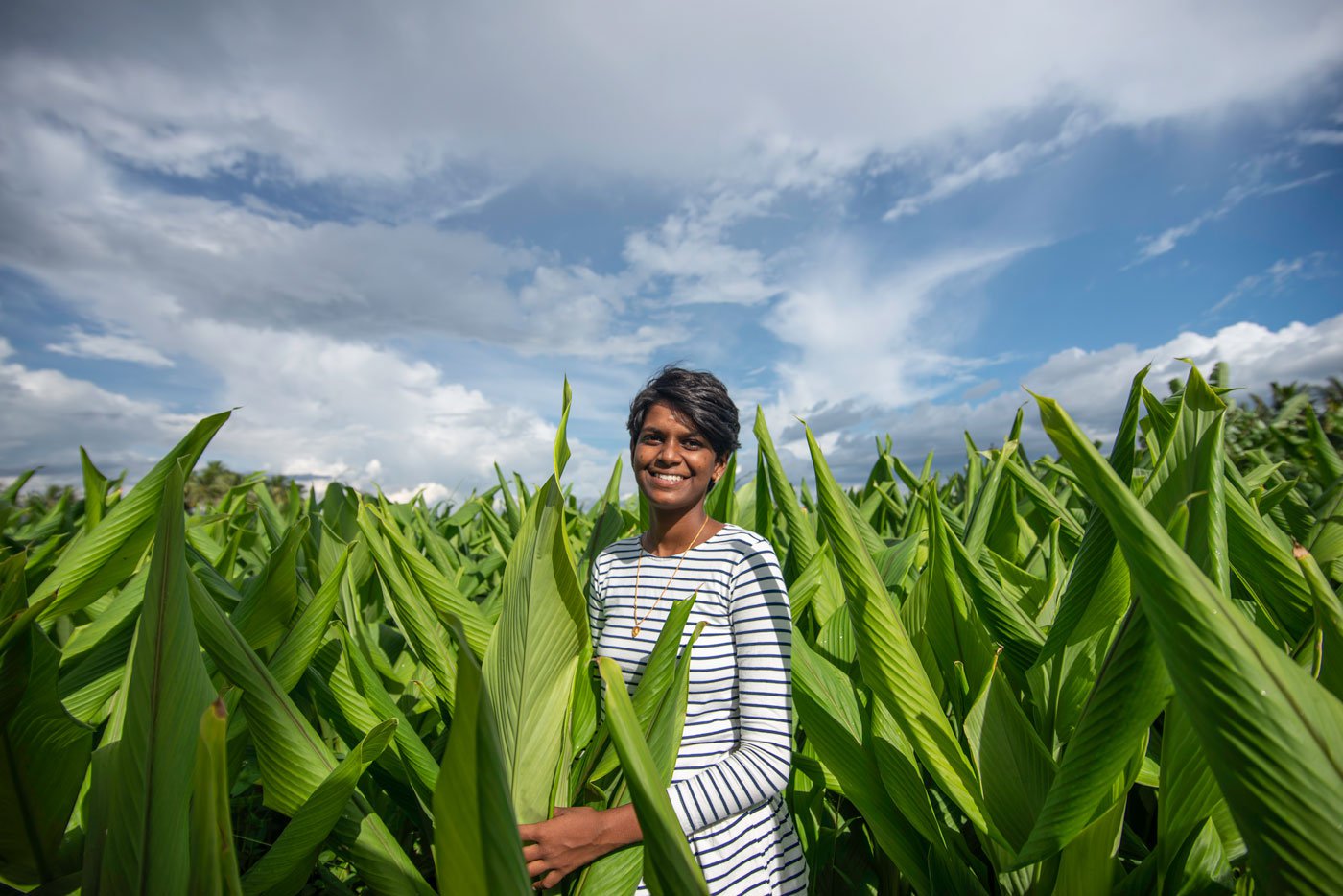
“I always have energy,
” she says, laughing
When she tonsured her head a couple of years ago in front of her family deity, many people commented unfavourably. Her parents stood by her, they said she was beautiful. “I did it because I kept falling sick. I would have liked to donate my hair to cancer patients, but I couldn’t then. Shaving it off gave me confidence,” she says. “I realised my identity is not tied to my hair. And I am happy that my parents love me anyway.”
And they stand by her dreams. Many of the 60 female batchmates from her undergraduate course are married. “Because of the lockdown, they married the girls off. Some go to work. Nobody else has started a business.”
Usha Devi Venkatachalam believes Akshaya’s success can change that. “The fact that a young woman born in the area is stepping up to set up a processing unit locally with national and global ambitions is in itself inspiring,” she points out, “and will give others, especially her peers, ideas.”
For Akshaya, the next stop is an MBA. “Many people do that and then start a business. I’m doing the opposite.” And she believes it will be useful. She’s clear that she wants to remain in her hometown and build her brand from here. She has a website, is on Instagram and LinkedIn, posts recipes, uses hashtags (reclaiming the term #turmericlatte among others) and wants to connect with FPOs and exporters. “Farmers can look after their fields and people like me can pitch in with the selling,” she says. Effectively filling crucial gaps between farm, market and home.
“Nowadays, it is all about storytelling,” she says firmly. “When customers keep my packaging in their house – say, if they use the drawstring pouch to save money – they will remember and recall our brand and buy it again.” And in turn, she feels, Tamil Nadu’s turmeric will travel far. And wide…
This research study is funded by Azim Premji University as part of its Research Funding Programme 2020.
Cover photo: M. Palani Kumar